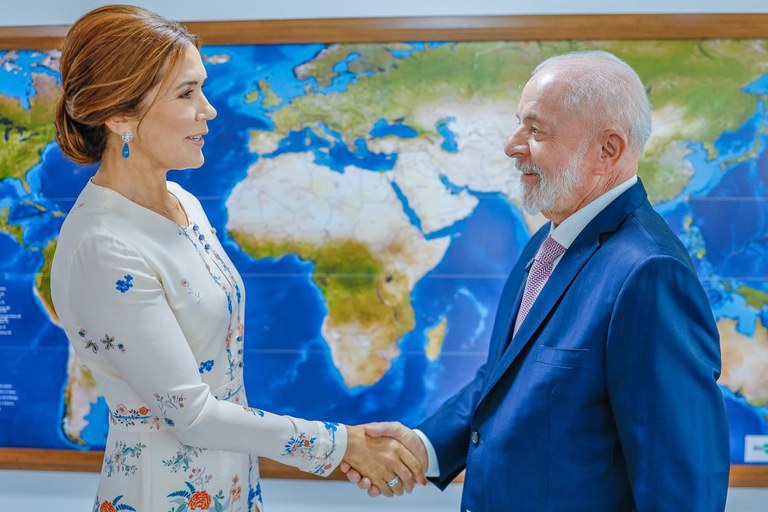Notícias
FOREIGN AFFAIRS
President Lula meets with Queen of Denmark at Planalto Palace

President Lula during meeting with Queen Mary of Denmark, at Planalto Palace - Credit: Ricardo Stuckert / PR
President Luiz Inácio Lula da Silva hosted a meeting this Friday (4) with the Queen Mary of Denmark, at Planalto Palace. Also in attendance were the Brazilian ministers of Foreign Affairs, Mauro Vieira, and Health, Nísia Trindade, as well as the Special Advisor to the Presidency, Celso Amorim. The queen was accompanied by the Danish Minister of Climate and Energy, Lars Aagaard, and the Danish Ambassador to Brazil, Eva Bisgaard.
President Lula started the meeting by saying that he had good memories of Denmark from his participation at COP15, in 2009, in Copenhagen, and from announcing, in that same year and city, that Rio de Janeiro would host the 2016 Olympic Games. “It was perhaps the most thrilling moment of my life”, said the president. He recalled that he had visited Denmark as a unionist before he became president, and highlighted the cooperation between Brazilian and Danish unions.
Lula spoke about the process of rebuilding ties with the world since, during the previous administration, nobody wanted to visit Brazil or host the Brazilian president. He described how the country has a renewable energy matrix in which 90% of its electricity is generated from clean sources, and explained the plans to advance the energy transition.
The president invited Denmark to join the Alliance against Hunger and Poverty, which Brazil will launch during the G20 meeting in November, in Rio de Janeiro.
Lula also thanked Denmark for returning the Tupinanmbá Mantle to the National Museum in Rio de Janeiro. The item is considered a living entity, with a spiritual nature, which represents the identity, memory, and sense of belonging of the Indigenous peoples of Brazil, particularly the Tupi populations.
Furthermore, the president underscored Brazil’s commitment to bringing deforestation levels in the Amazon down to zero.
The queen expressed solidarity regarding the floods that affected the Brazilian state of Rio Grande do Sul and the droughts and wildfires in other regions across the country. She added that Brazil and Denmark share many values and ideas and presented the themes in her agenda with Brazil, which include access to health via telemedicine, gender equality, and environmental conservation. She highlighted that her visit started in Manaus, where she was able to see the Amazon and the effects of the dry spell.
She also stated that all the participants of this trip wish to promote proximity and a close relationship between the two countries.
COOPERATION IN HEALTH — Minister Nísia Trindade emphasized the effort of the current administration to resume cooperation between Brazil and Denmark in the area of health. Both countries have universal health care systems, and Denmark is a reference in several sectors, including telemedicine.
The Brazilian Minister also spoke about the importance of cooperation in the area of hospitals and the investments in the area of health in Brazil by Danish companies such as Novo Nordisk, which produces and exports from its Brazilian factory located in Montes Claros, in the state of Minas Gerais.
Executives Simone Tcherniakovsky, vice-president of Corporate Affairs and Sustainability at Novo Nordisk Brasil, and Reinaldo Costa, corporate vice-president at Novo Nordisk in Montes Claros, conveyed to the president the announcement of a BRL 864 million (approximately USD 158,082 million) investment for the modernization of the insulin production line and the implementation of sustainability projects at the company's plant in Minas Gerais, throughout 2024 and 2025. Inaugurated in 2007, this plant is responsible for the entire production process of different types of insulin, being one of the main suppliers of this product to Brazil’s Unified Health System (Sistema Único de Saúde / SUS).
COMMERCIAL RELATIONS — Relations between Brazil and Denmark are marked by friendship and settled on common interests and shared values. From an economic standpoint, this relationship has investment attraction as its main vocation, with steady agreements in the areas of trade, energy, and the environment. In trade, between January and August 2024, the exchange between the two countries totaled USD 1.5 billion. Brazilian exports reached USD 345.7 million and imports reached USD 1.1 billion. The Brazilian imports agenda is based on pharmaceutical products, including veterinarian medications, while the exports agenda consists mainly of food products, soybean meal, pharmaceutical products, floating structures, and timber.
